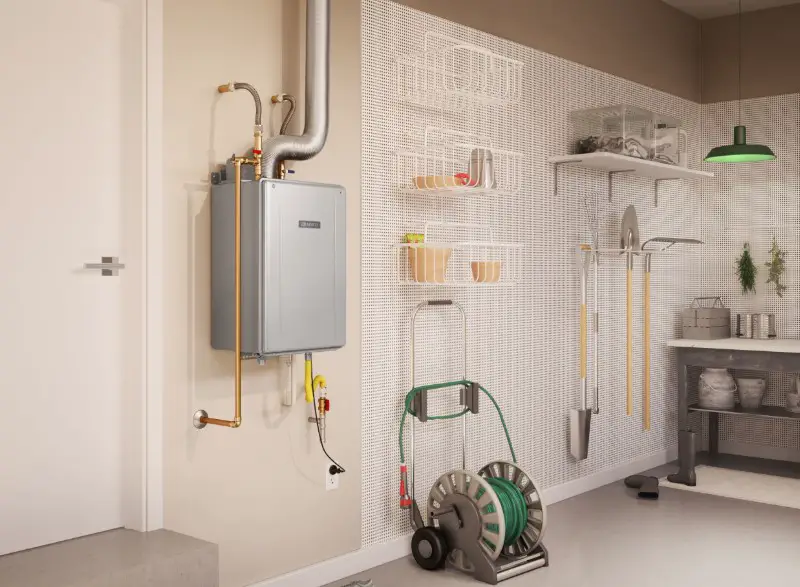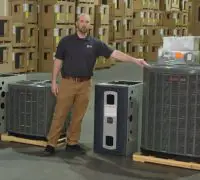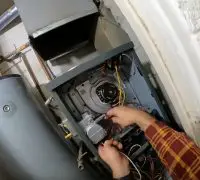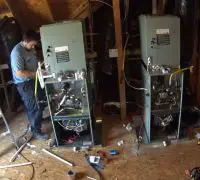If you're looking to fix or replace your Heating or A/C system, we can connect you with a reliable and cost-effective professional in your area.
One of the many reasons for which you may have switched to a tankless water heater is the durability. With water only running through the system and not having time to affect the components, it makes sense that tankless water heaters take the use for decades. However, many other aspects impact the long lifespan of tankless water heaters. Don’t stop reading so that you find out why it is so.
Page Table of Contents
- What’s to say in a nutshell about the lifespan of tankless water heaters?
- Do tankless water heaters last longer than conventional tank-style water heaters?
- What’s the explanation for the long life expectancy of tankless water heaters?
- Why can tankless water heaters last for 20 years?
- Can you make your tankless water heater last longer?
- One last piece of advice before you go
What’s to say in a nutshell about the lifespan of tankless water heaters?
It doesn’t matter if you’re getting gas or electric tankless water; the life expectancy is somewhere between 15 to 20 years. However, the lifespan depends a lot on the operation and maintenance.
The quality of the water in your region also depends a lot, as hardness may still affect the performance and durability of a tankless water heater. Even if water only runs through the system, scale clinging to heating elements and sediment content is still a severe matter to tankless units.
Flushing the tankless water heater once a year will eliminate any scale buildup around the heating elements. When a tankless water heater has scale buildup has to work harder for heating the water, which may damage it and reduce the durability too.
Do tankless water heaters last longer than conventional tank-style water heaters?
Most traditional water heaters with tanks last for 12 years or so, whereas the tankless opponents can last for 20 years. You do the math.
What’s the explanation for the long life expectancy of tankless water heaters?
In the case of conventional water heaters with tanks, the leading cause for shorter lifespan is the corrosion caused by the moisture that affects the system 24/7/365. Even if you may still replace some of the parts (the heating elements, for instance), there’s nothing much to do once the tank has failed. The only solution is to buy a new water heater, with tankless systems as a reliable option.
Truth be told, a tankless water heater can also be affected by the hardness of water, but the exposure to corrosion is a lot less considerable.
Why can tankless water heaters last for 20 years?
Durability is one of the selling points for tankless water heaters, and tankless water heaters are a wise investment to make in the long run.
We know that from the upfront investment point of view, a traditional system with a tank may seem like a more affordable option (it is cheaper, for sure). However, you should give it a second thought since the tankless units will last 20 years and not 10-12 years like the tank-style water heaters.
Here are the main reasons for which tankless water heaters are more durable:
- They build together
You may be tempted to think that the tank-style water heaters are sturdy and robust, due to all that steel in the build. Don’t forget that steel has one principal enemy: water, which can lead to rust sooner than expected.
Tankless water heaters are made with copper, plastic, or stainless steel, so the problem for rust is eliminated. They’re also smaller than the water heaters with tanks, saving you storage space. However, size has nothing to do with durability or strength.
- They don’t need to run all the time
As tankless water heaters only give hot water on demand, they don’t need to work all the time, like water heaters with tanks do. It may sound incredible, but a family may use the tankless unit for just one hour a day. When nobody is using hot water, the tankless water heater doesn’t run.
For the tank-type units, the situation is very different. Not only that, they store water in the tank, but they also use energy for maintaining the water hot and ready for whenever you tap the hot water. The tank water heaters will cycle on and off regularly, even when nobody is using the hot water. Therefore, the water gest to stay in the system a lot, wearing and tearing the components of the system.
- Water doesn’t affect the tankless water heater that much
Water hardness is a serious matter, and it refers to the concentration of minerals, with calcium and magnesium being the most problematic. Hard water has a higher level of calcium and magnesium, and the compounds will eventually buildup around the flue. Some may even break off and settle at the bottom of the tank. It’s only a matter of time until the accumulation will alter the heater’s performance and shorten the lifespan.
In the case of tankless water heaters, the risk for buildup is lower as water doesn’t have many places where to collect within the system. Some deposits will form, but water running through the system may be enough for eliminating them.
At the end of the day, it makes perfect sense why the tankless water heaters will last longer than the traditional systems with tanks.
Can you make your tankless water heater last longer?
Even if your tankless water heater is supposed to last for a long time, you should, nevertheless, try some tips for sustaining its durability:
- Install it correctly
Many modern tankless units are easy to mount on your own, but it’s always better that you get professional help for the installation. Choose the perfect place for the tankless unit so that nothing affects its performance. For instance, it’s not a good idea to mount it in the laundry room since it may suck-up damage-causing lint.
- Never skip maintenance
Flushing the tankless water heater is one of the things you need to do to ensure its best performance and expanding the lifespan. Typically, you need to do it once a year, but it depends a lot on the water hardness in your area.
You should also install a water softener so that you ease out the efforts of your tankless unit when the hardness of water is high.
One last piece of advice before you go
Tankless water heaters are supposed to last up to two decades. However, there are plenty of things that can affect durability. The improper installation, the lack of maintenance, and even the wrong settings can alter its performance and, ultimately, its durability.
We can definitely connect you with a trusted provider in your area to repair, replace or maintain your heating and A/C systems. Why not let us find a professional for you?






